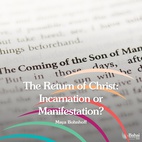The views expressed in our content reflect individual perspectives and do not represent the authoritative views of the Baha'i Faith.
We’ve all read about the return of the prophets of God—but what actually happens when those prophets do return?
Do the heavens really part? Are the skies literally cleft asunder? Do the stars fall upon the Earth? Does the lion lie down with the lamb? No, the Baha’i teachings tell us—those phrases are metaphors, not meant to be taken literally, but indicative of a spiritual rather than a physical reality:
The Book of Isaiah announces that the Messiah will conquer the East and the West, that all the nations of the earth will gather under His shadow, that His kingdom will be established, that He will come from an unknown place, that the sinners will be judged, and that justice will prevail to such a degree that the wolf and the lamb, the leopard and the kid, the sucking child and the asp will all gather at one spring, in one meadow, and in one abode. The first coming was also subject to these conditions, although none of them came to pass outwardly …. Now, each and every one of these conditions had an inner meaning, but the Jews failed to understand and were therefore veiled from recognizing Him.
The second coming of Christ follows a similar pattern. All the signs and conditions that have been indicated have inner meanings and are not to be taken literally. For otherwise it is said, among other things, that the stars will fall upon the earth. Yet the stars are endless and innumerable, and modern mathematicians have established and proven that the mass of the sun is approximately one and a half million times greater than that of the earth, and that each one of the fixed stars is a thousand times larger than the sun. If these stars were to fall upon the surface of the earth, how could there be room for them? It would be as though a thousand million mountains as mighty as the Himalayas were to fall upon a grain of mustard seed. Such a thing is, by reason and by science (and indeed as a matter of simple common sense), utterly impossible. And yet even more astonishing is that Christ said: Perchance I shall come when you are sleeping, for the coming of the Son of man is like the coming of a thief. Perhaps the thief will be in the house and the owner will be unaware.
It is therefore clear and evident that these signs have inner meanings and should not be taken literally. – Abdu’l-Baha, Some Answered Questions, newly revised edition, pp. 125-126.
The Day of Judgment
Baha’u’llah calls the Day of Resurrection that day when “the former Dispensation is superseded and annulled,” and asks us to try to comprehend the profound importance of such a spiritual revolution:
In like manner, strive thou to comprehend … the meaning of the “cleaving of the heaven”—one of the signs that must needs herald the coming of the last Hour, the Day of Resurrection. As He hath said: “When the heaven shall be cloven asunder.” By “heaven” is meant the heaven of divine Revelation, which is elevated with every Manifestation, and rent asunder with every subsequent one. By “cloven asunder” is meant that the former Dispensation is superseded and annulled. – Baha’u’llah, The Book of Certitude, p. 44.
This “cleaving of the heavens” occurs in every era of human history. The Baha’i teachings refer to that divine cycle of spiritual seasons as progressive revelation—the concept that all religion gradually, progressively and perpetually unfolds as part of a single system, each holy messenger linked to the previous one in unified great chain of being:
Among the bounties of God is revelation. Hence revelation is progressive and continuous. It never ceases. It is necessary that the reality of Divinity with all its perfections and attributes should become resplendent in the human world. The reality of Divinity is like an endless ocean. Revelation may be likened to the rain. Can you imagine the cessation of rain? Ever on the face of the earth somewhere rain is pouring down. Briefly, the world of existence is progressive. It is subject to development and growth. – Abdu’l-Baha, The Promulgation of Universal Peace, p. 378.
For Baha’is, the concepts of resurrection, renewal and the Day of Judgment all refer to this central Baha’i principle of progressive revelation. They embody the fact that God never leaves humanity bereft of love and guidance:
God hath, at all times and under all conditions, been wholly independent of His creatures. He hath cherished and will ever cherish the desire that all men may attain His gardens of Paradise with utmost love, that no one should sadden another, not even for a moment, and that all should dwell within His cradle of protection and security until the Day of Resurrection which marketh the dayspring of the Revelation of Him Whom God will make manifest.
The Lord of the universe hath never raised up a prophet nor hath He sent down a Book unless He hath established His covenant with all men, calling for their acceptance of the next Revelation and of the next Book; inasmuch as the outpourings of His bounty are ceaseless and without limit. – The Bab, Selections from the Writings of the Bab, pp. 86-87.

















Comments
Sign in or create an account
Continue with Facebookor